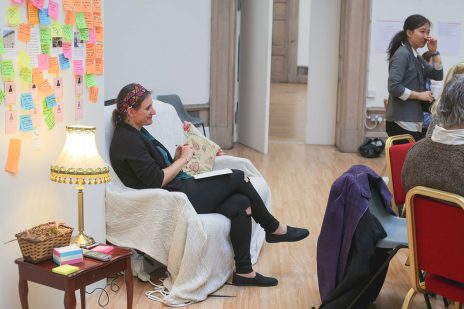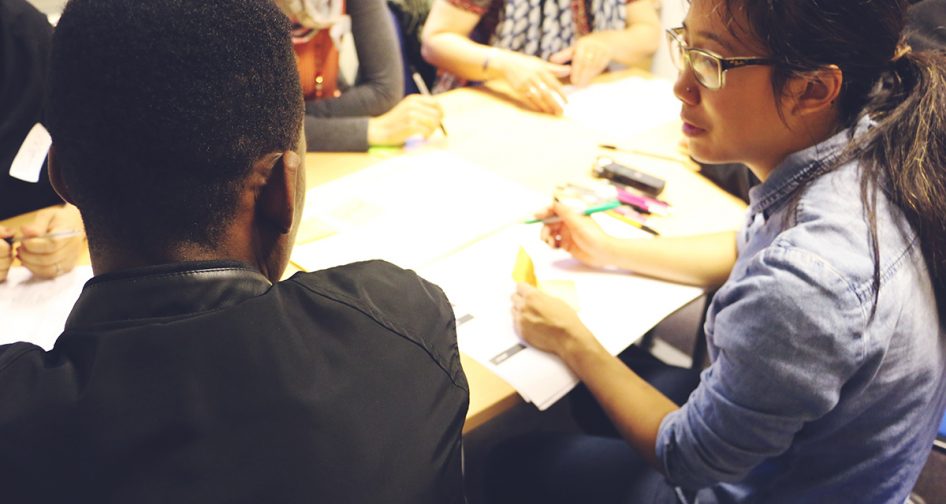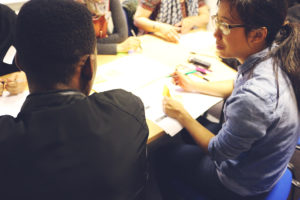Research workshops on emotional topics: 6 things to consider.
It’s been a busy month for our research team. I’ve been working on two research projects: #techvsabuse exploring the potential of technology in tackling domestic violence against women and girls, and exploring future customer needs when it comes to social housing with the Wheatley Group.
We work a lot on research projects that cover a broad range of emotional topics with people across all ages and from different walks of life. As we have a depth of experience in this area and love sharing our knowledge, here’s a post for our research series on sensitive design of research sessions. If you have something else to add or argue against – just give us a shout.
Creating a comfortable atmosphere and safe environment is vital when running a workshop or conducting an interview on emotional topics. Always put empathy at the heart of your design approach – not just the physical design of your tools. This can include thinking carefully about the questions you’re asking, the physical environment and the way content is displayed. But at the end of the day, it relies on the facilitator making sure people are comfortable and everything is ok.
1. Facilitation doesn’t mean following an agenda and timings – it’s everything
I’ve found this to be the most commonly misunderstood item on this list. Facilitation goes beyond leading people through an agenda and list of questions (or as we call it, discussion guides). We always say ‘be prepared to throw your agenda out of the window’. Even though preparation takes place before the workshop and we take care to (co-)design sensitive tools, we rely on our emotional intelligence to adjust, remove or add certain workshop elements and make sure everything works for participants. The most important thing is to start conversations, hear stories and share experiences. We all have tricks and methods up our sleeve to enable us to do this.
And, of course, it’s not always up to one individual facilitator to do all of this – it includes everyone.

But bucket improvisation: is someone in the room blocking discussions and saying 'but...'? Encourage them to write it down and put it in a basket/jar/mug/whatever you have. This way, you also have a list of 'barriers' afterwards.
2. The small things can be big things
Food and hot drinks provided can change the whole atmosphere. Personally, even I will feel more special and appreciated if I get some cookies and munchies (and I do love them!) You might also consider reimbursing travel expenses but do think about how participants will get back to where they live. Incentives including cash and vouchers always make for a nice surprise at the end of sessions. We always take care to consider what kind of gift we provide. In the case of working with young people on projects with Triborough in London, NHS Greater Glasgow and Clyde and Glasgow Council, we agreed with social workers and support staff the most appropriate type of vouchers to provide.
In the case of continuous research workshops and getting to know participants, there are even more things you could do. During The Matter, we wrote reference letters for young people who worked with us over the course of the project.
3. Space design
If we’re not visiting someone in their home or place of work, as we would usually do for contextual interviews, we ensure the space we’re inviting people into is appropriate for the situation. Do you need a separate quiet space? Things can get heated or painful memories might be revived during discussions and people might want to step away for a bit. Are there tissues nearby? Is there an experienced support person on-hand if required? We recently facilitated a workshop with women victims and survivors of domestic abuse. It was important to have an Independent Domestic Violence Advisor (IDVA) present at the session and a chill out area with soft furniture – for mingling, eating or just to have a step back and relax. Other things to think about might include: is the space accessible for all participants? Is it a formal setting or a relaxed one? Which might be more appropriate for this piece of work?


4. Is there support for participants that can be planned in advance?
Sessions – whether interviews, focus groups or workshops – can make us emotional, exhausted, scared, happy, frustrated etc. Think beyond what happens at the workshop – is there anything you can do to ensure participants can get home safely? Or any relevant support available? I once attended a workshop on planned parenthood to support a friend. The workshop had opened up a great discussion on the topic but many women went back home with the emotional issues we had discussed playing on their minds. We all know this is not healthy.
During our research on social housing with Wheatley Group, we planned workshops to take place at the premises of supporting organisations – including Glasgow Disability Alliance and Scottish Refugee Council. You might feel more comfortable if attending a workshop at a familiar venue with familiar staff member or even with a friend, right? For #techvsabuse, we invited domestic violence survivors to attend with a practitioner who supports them or a friend. It makes all the difference. So, put yourself in your potential participant shoes, what would make you feel most comfortable to join the session? Don’t be afraid to ask other people who are experts within this area and collaborate with them.

Research for Wheatley Group project at Scottish Refugee Council; October, 2016.
5. Having the last point in mind, closing a workshop session is crucially important.
What happens with the research next? Will participants be contacted again? Who can they contact if they have more questions? Who can they contact if they’re in distress later on? As general Snook practice, we produce Participant Information Letters outlining what the project is about, what will happen as a result of it and who to contact in case of further questions. We believe this is important because we, as humans, don’t retain all the information we’re given in a busy setting and sometimes need time to think things over afterwards.
Think about how are you going to close the feedback loop – for example, how will participants find out what happens with the information? You might want to let them know what the next steps are and be completely transparent with them over expected outcomes and commitments. The last thing you want is to have participants feel used or burnt out by your work. Having good research practices and ethics is key here.
6. Look after yourself
Are you going into a safe environment? Do you have other facilitators on hand to look out for you? Talk to them so you can each take a break when you need to. Debrief afterwards and check-in emotionally. For particularly heavy pieces of work, make sure someone is checking in with facilitators before, during and after engagement sessions. Having adequate time and space to recuperate is equally as important. At the end of the day, you can’t look after others if you don’t look after yourself. More on this point in a whole new blog post coming soon!
Overall, these six pointers can be combined into one: help people have conversations without imposing your own views, whilst looking after yourself and participants.
Read the next research series posts: how to look after yourself and colleagues.
